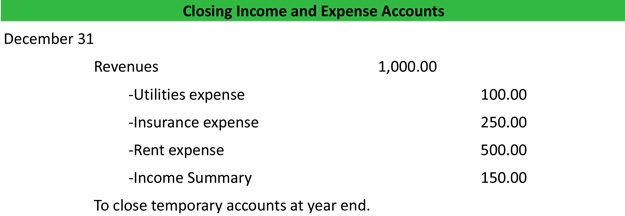Definition: The income summary account is a temporary account used to close all income and expense accounts at the end of an accounting period. Basically, the income summary account is nothing more than a placeholder for the income and expense accounts at the end of the period.
What Does Income Summary Mean?
At the end of each accounting period, all of the temporary accounts are closed. You might have heard people call this “closing the books.” Temporary accounts like income and expenses accounts keep track of transactions for a specific period and get closed or reset at the end of the period. This way each accounting period starts with a zero balance in all the temporary accounts.
Example
At the end of a period, all the income and expense accounts transfer their balances to the income summary account. The income summary account holds these balances until final closing entries are made. Then the income summary account is zeroed out and transfers its balance to the retained earnings (for corporations) or capital accounts (for partnerships). This transfers the income or loss from an income statement account to a balance sheet account.
This is the only time that the income summary account is used. For the rest of the year, the income summary account maintains a zero balance. Here are some example closing entries. As you can see, the income and expense accounts are transferred to the income summary account.

This final income summary balance is then transferred to the retained earnings (for corporations) or capital accounts (for partnerships) at the end of the period after the income statement is prepared. This income balance is then reported in the owner’s equity section of the balance sheet.



